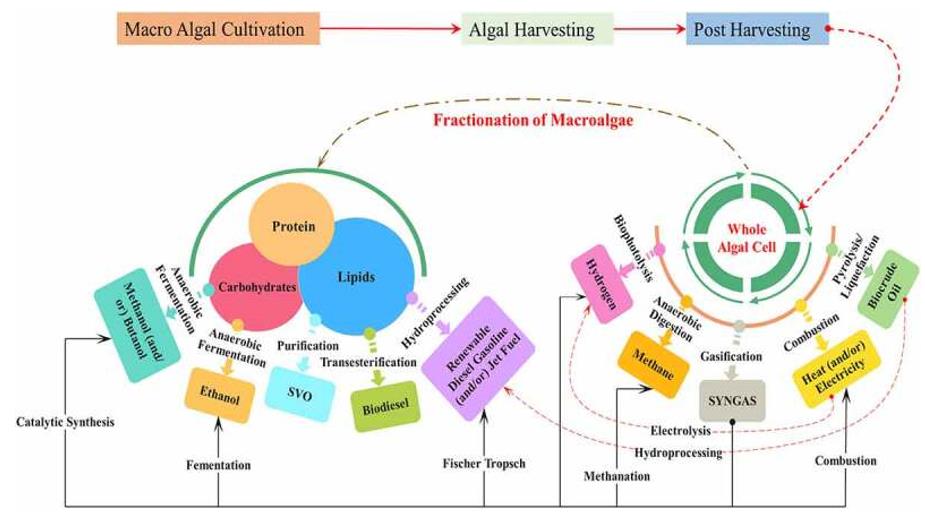The world's largest fuel source is rapidly and unpredictably diminishing due to population growth and growing demand in the renewable energy sector, primarily associated with rapid urbanization and industrialization. Fossil fuels are a major but not renewable source of energy, and their excessive use leads to environmental impacts, poor air quality, and global climate change. Providing a unique and sustainable source of energy is, therefore, a key issue. Seaweed is non-lignocellulosic and, together with microalgae, is considered a third-generation biofuel feedstock. Compared to microalgae, seaweeds have a low lipid content and are, therefore, rarely used for biofuels, especially biodiesel. Nevertheless, they are still a potential biomass source for other biofuels.
 Fig 1. Macroalgal biofuel refinery. (V GS, et al., 2021)
Fig 1. Macroalgal biofuel refinery. (V GS, et al., 2021)
Seaweeds are becoming increasingly popular as a viable and promising renewable resource for biofuel production. The most common processes used to produce biofuels are transesterification, liquefaction, fermentation, anaerobic digestion, and pyrolysis. However, the complex structure of algal biomass can affect the hydrolysis process, a rate-limiting step that consumes more time and can also affect the yield of biofuels. We offer a variety of optimized pretreatment methods to dissolve the complex substrates in algae, such as physical, chemical, biological, mechanical, and combined methods. Based on these methods, we can easily help you to increase your biofuel yield.
Lifeasible is constantly developing the potential of biofuel production from macroalgae and is committed to providing specialist solutions for seaweed biofuel applications. We offer a variety of biochemical and thermochemical methods to extract the following biofuels from seaweed:
The role of nanotechnology in macroalgal biorefineries is to synthesize nanoparticles for moving components in algal biomass due to high surface area. We are enhancing algal biofuel production by synthesizing nanoparticles to immobilize cellulase to minimize hydrolytic enzyme consumption. The biosynthesis of magnetic nanoparticles for biofuel production is also in progress.
Lifeasible is constantly exploring the maximum potential of seaweed applications. We try to develop the next generation of seaweed as a sustainable source of biofuel for transportation using advanced biorefinery processes. We are your trusted partner in all aspects of seaweed research. If you are interested in our solutions, please do not hesitate to contact us.
Reference
Lifeasible has established a one-stop service platform for plants. In addition to obtaining customized solutions for plant genetic engineering, customers can also conduct follow-up analysis and research on plants through our analysis platform. The analytical services we provide include but are not limited to the following:
Get Latest Lifeasible News and Updates Directly to Your Inbox
Adaptive Evolutionary Mechanism of Plants
February 28, 2025
Unraveling Cotton Development: Insights from Multi-Omics Studies
February 27, 2025